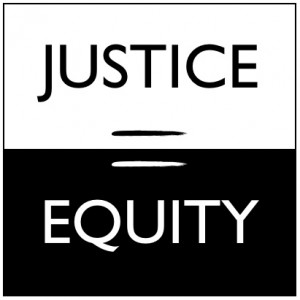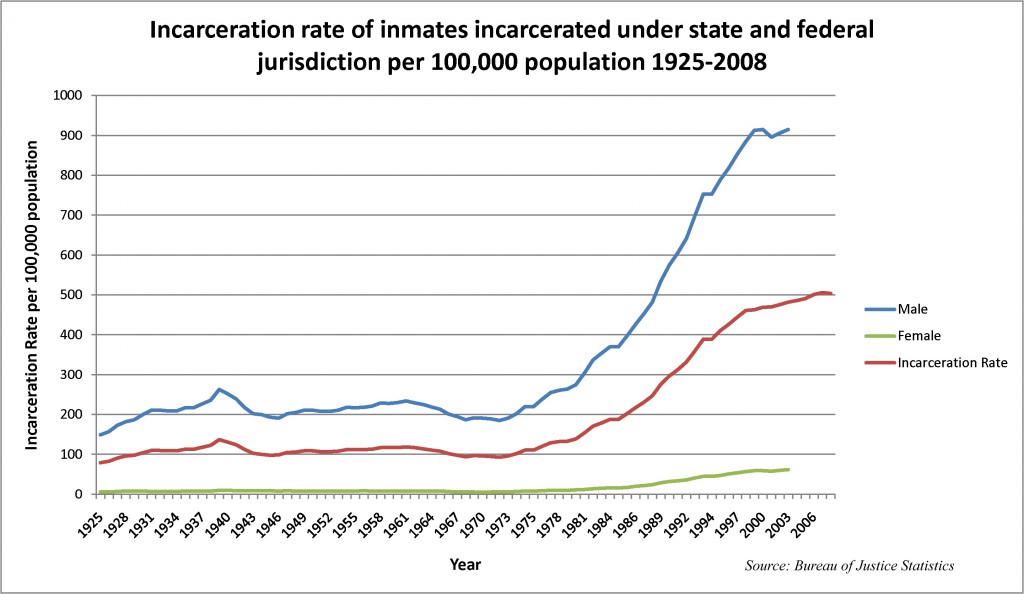[Note: The following is written as a personal appeal directed to those who are concerned about the incarceration crisis in the United States. Feel free to comment or suggest changes. You can also discuss this on Facebook. This document was revised on 25 April 2013 based on feedback received in the Facebook discussion.]
 Introduction. Visit the news feed of Justice Equity on Facebook and you’ll learn about the global incarceration crisis of which the United States finds itself to be the leader [source]. In summary, there seems to be a class warfare that incarcerates people of color and those who are poor, while at the same time imposing lighter penalties, fines, and jail times for the white and wealthy. [source] The problem is exacerbated by for-profit prisons that have no incentive to reduce sentencing or support jail alternatives and diversion programs. An ongoing war on drugs also feeds the growth.
Introduction. Visit the news feed of Justice Equity on Facebook and you’ll learn about the global incarceration crisis of which the United States finds itself to be the leader [source]. In summary, there seems to be a class warfare that incarcerates people of color and those who are poor, while at the same time imposing lighter penalties, fines, and jail times for the white and wealthy. [source] The problem is exacerbated by for-profit prisons that have no incentive to reduce sentencing or support jail alternatives and diversion programs. An ongoing war on drugs also feeds the growth.
Protest. Citizens have protested the above conditions and requested drug law reforms, graduated bail, and shorter sentencing, as well as changes in the intensity and focus of policing. Little has changed. So, as a last resort, protesters are using their power to vote as a means to prevent municipalities from building more or expanded jails. Unchanged, the current justice system, at the current rate of arrest and incarceration, needs larger jails. Those opposed to incarceration see the ability to stop jail and prison expansion as a form of social protest that will force the justice system to reform when the last jail cell is filled.
Counter Productive. Given the crisis described above, members of the movement may at times be blinded to the circumstances where expanded jails, courthouses, and justice system infrastructure may result in better conditions and circumstances for those incarcerated — e.g. safer and less crowded jails as well as a faster justice system. In circumstances where courts were previously backed up and overburdened, expansion can result in faster trials and less jail time.
Johnson County Justice Center. In Iowa, the Johnson County Justice Center proposal is an example of the phenomenon described above. It’s a facility that will very likely result in better services and conditions for all involved, yet some oppose it. The county population has increased significantly in the past 100 years since the courthouse was first constructed. This results in an overburdened court system with delays — causing longer incarceration rates. Increases in the frequency and severity of crimes combined with greater policing and a lowered tolerance for criminal activity has resulted in more arrests. The presence of active, engaged, attentive, well-funded, and hard-working law enforcement officers in higher numbers also results in higher arrest rates. The demographics of the county have changed. Part of the increase in population is the result of new residents who previously lived in larger metropolitan areas (or other states) where certain violations may not be as strictly enforced. Despite all of these factors, some people are fighting the county’s proposal for an expanded courthouse and jail. The Justice Center proposal is modest. The majority of the cost for the proposed Justice Center is for the courthouse expansion, with about 34% of the cost going to construct the new jail portion of the project. The jail will accommodate about 195 inmates rather than the average of 910 for a similar population. [Source] With greater resources, the county plans to expand on jail alternatives and diversion programs that are already in place. [Source]
Difficult Vote. The May 7 vote for the Johnson County Justice Center is difficult for those who are generally against blank-check incarceration expansion, because in this case the expansion will result in better justice for those who are arrested. As such, a NO vote will perpetuate an overburdened system. This is a difficult situation where the best choice for those opposed to incarceration may be to vote in favor of expanded resources.
Outcome Based Voting. Get informed with facts and not emotional appeals or peer pressure, and vote for what you believe is best for everyone involved. Consider the actual outcome of your vote upon all people involved. Consider what will happen if people continue to have delays in trials and inmates are shipped to other counties, away from family and resources that might reduce recidivism.
Rising Incarceration Rates. Incarceration rates have gone up 500% over the past century. As the chart below shows, we are either becoming a more criminal society or perhaps we’re arresting and incarcerating lots of innocent people. Crime tends to increase in rate and severity for larger urban centers compared to small towns. So, increasingly large cities may be a cause of increased national crime rates. Click the chart below for an enlarged view. [Source: Wikipedia]
__________
Document History. This document has been revised since its original posting based on feedback from readers.
